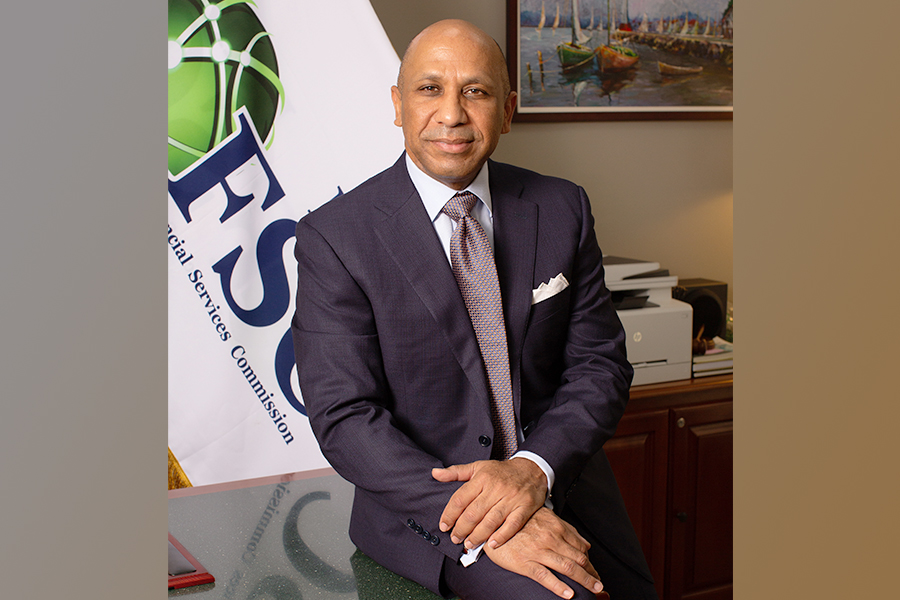
11 Mar Interview with Claude Haylock, IMMARBE and FSC, Belize
PANORAMA spoke to Claude Haylock, Director General, International Merchant Marine Registry of Belize (IMMARBE), Director General & Deputy Chairman, Financial Services Commission of Belize (FSC)
How much progress has Belize made in terms of transparency and rule of law and what steps has Belize taken to position itself as a regional leader in good governance?
Investor confidence is paramount—both the confidence of external investors and that of our citizens in the systems we’ve built. Belize has made significant strides in fostering good governance and transparency, ensuring that our jurisdiction is open, clear and conducive to business. Ambiguity and uncertainty are major deterrents for investors, so we prioritize creating predictable, transparent rules and outcomes for all stakeholders.
One of our most transformative steps has been the complete digitization of Belize’s company registry. Today, an individual can incorporate a business online within 24 hours, from anywhere in the world. Additionally, we’ve reduced the cost of incorporation and streamlined access to information about legal entities, which has simplified compliance and improved efficiency.
While we are not an open register, we ensure that authorized authorities, such as law enforcement and financial regulators, can access vital information when needed—for instance, to support investigations or conduct due diligence. This accessibility not only strengthens regulatory oversight but also builds trust in our systems.
Furthermore, we’ve taken deliberate steps to support small and medium enterprises (SMEs), many of which have historically operated in the informal sector. By simplifying the business registration process and lowering barriers, we’ve helped these businesses formalize, opening the door to critical opportunities like accessing financing and attracting investors. This shift strengthens our economy’s foundation, fosters sustainable growth and enhances Belize’s appeal as a destination for foreign investment.
How has the regulatory environment recently changed in Belize due to ongoing international requirements for maritime and financial services activities and how important is it for local regulators to join the international community?
We try to work in step with global regulators. We take international standards and tailor them to our own circumstances to make them more user friendly and more approachable for the type of investors that we are trying to attract. We do what we like to call a first-in-class regulatory regime in Belize. It’s open, transparent, rule-based, information is easily accessible and keeps the cost of doing business low.
Furthermore, the reforms we’ve implemented over the past three to four years are yielding tangible results. With the World Bank preparing to release a new set of rankings, we believe Belize is well-positioned to achieve strong marks, reflecting the significant strides we’ve made under the leadership of this government. These advancements further solidify Belize’s reputation as a secure, transparent and attractive destination for foreign investment.
What role do local regulators play in supporting innovation and entrepreneurship in Belize?
Local regulators play a pivotal role in fostering a business-friendly environment that encourages innovation and entrepreneurship. Beyond their regulatory functions, our primary goal is to create a safe and supportive ecosystem where businesses can thrive.
Notably, the Belize Companies and Corporate Affairs Registry (BCCAR) has received significant recognition for its contributions, including the MSME Champion Award, sponsored by The Belize Trade and Investment Development Service and the Innovation Award from the World Society of Information under the International Telecommunication Union in Geneva.
To promote accessibility and inclusion, BCCAR has taken its services directly to the people through roadshows, reaching even the smallest villages. This outreach, combined with the ability to perform essential tasks via smartphones, eliminates the need to travel to urban centres, making it easier for entrepreneurs to formalize and grow their businesses. These initiatives are essential for driving business growth and supporting sustainable economic development in Belize.
IMMARBE plays an important role in complying with international maritime regulations. Can you give our readers an overview of IMMARBE’s current mission and responsibilities as we enter 2025?
IMMARBE is a cornerstone of Belize’s service offerings, recognized as a reputable and efficient maritime flag. With just under 1,000 registered ships — primarily bulk carriers and tankers — our focus is on maintaining a modern, competitive fleet by adhering to strict regulations that ensure our vessels are new and environmentally sustainable. IMMARBE operates as a global, 24-hour service, providing cost-effective and responsive support to shipowners worldwide. Since transitioning from private concession to government control in 2013, we’ve taken proactive steps to align with emerging international maritime regulations, including those related to green fuels and sustainability.
We have a lot of IMO regulations coming out about green fuel and things like that, we need to take advantage of those opportunities while ensuring that our ships comply and are ready to be part of that transition. We also have as a small part of IMMARBE the High-Seas Fisheries Union, where we offer fishing licenses for quotas that are allocated to Belize, based on the law of the sea convention. We also make sure that there is compliance with the fishing license regime, as well as sustainability regulations to make sure that marine resources are sustainably managed. This ties into the government’s focus on the green economy. We also see opportunities to register yachts from Florida. The tag of Belize is “The Friendly Register”. We have a coastline and the ability to moor yachts here, which might become big business in the near future.
What are your key competitive advantages and strategies for promoting the registry and the Belize flag?
Belize offers a combination of unique advantages that set our flag apart. We are an English-speaking jurisdiction with a government-owned and controlled registry, which provides a high degree of credibility and confidence for shipowners.
Our regulatory processes are time-efficient, our fees are competitive and our government’s direct oversight ensures accountability and responsiveness. Unlike other major registries operated from distant locations, the Belize flag’s sovereignty-backed reputation makes it a trusted choice for shipowners seeking reliability and compliance.
What measures are being taken by the IMMARBE to ensure the safety and security of the region through modernized regulatory and monitoring techniques?
Sanctions compliance was one of the biggest pushes that we made. If we discover that any ship on our register is breaking sanctions, we immediately delete them. The US shares information with us about ships. We do our investigations and we immediately take action. We are well aware of the “Dark Fleet” problem and in fact we are at the forefront of cleaning up our fleet and making sure that none of them are engaged in sanctions-busting activities. In fact, we recently went through a round of deletions and we are constantly evaluating the fleet to make sure that it is clean and compliant.
Our collaboration with the US Treasury allows us to receive and act on intelligence in real time. We are committed to maintaining a “clean fleet” and recently conducted a comprehensive review and deletion process to ensure compliance. By adopting modern monitoring techniques and remaining vigilant, we are at the forefront of efforts to address issues like the “Dark Fleet” and uphold the integrity of our registry.
How would you describe economic cooperation between the U.S. and Belize particularly in the area of maritime regulation? How important of a partner is the U.S. in terms of ensuring the safety and continuity of Belize’s blue economy?
The United States is an indispensable partner in Belize’s economic and maritime development. Through initiatives like the Millennium Challenge Corporation Compact and support from USAID, the US has provided vital resources for energy security, education reform and capacity building.
In maritime regulation, we work closely with US authorities, including the Treasury, to ensure compliance with sanctions regimes and enhance training for our staff. This partnership strengthens Belize’s blue economy by promoting safety, sustainability and regulatory excellence.
What are your top three priorities as Director General of IMMARBE in 2025? How do you see IMMARBE’s role evolving to boost the international profile of Belize’s maritime industry and drive economic growth?
Over the past seven years, we have strengthened IMMARBE’s regulatory framework and human resources. Now, our focus is ensuring that these gains are sustainable and resilient. We are preparing for the next phase of growth, including compliance with green fuel regulations and expanding our service offerings, such as yacht registrations. By modernizing our operations and enhancing our responsiveness, we aim to position IMMARBE as a leader in the international maritime industry. These priorities align with Belize’s broader economic goals, including creating a dynamic, diversified economy that leverages our maritime assets.
What is your long-term vision for Belize’s economy over the next five to ten years? What key challenges need to be addressed for the country to fully achieve its potential?
Belize has long been an exporter of primary agricultural products. Agriculture is an important part of the economy and will remain so. We used to say that sugar is king because that was what our economy was centered on. But now tourism has become king. The government wants to see a much more diversified economy. When the pandemic hit tourism dried up and with it our economy, so our focus was on building out other types of services, especially financial services. Belize is a bank-centric economy, but we want to move away from that.
Our vision is to build a resilient, multi-sector economy by expanding financial services, developing capital markets through the new Securities Industry Act and creating alternative avenues for businesses to raise capital. Reducing reliance on traditional banking and focusing on value-added services will strengthen linkages across sectors of the economy.
By focusing on these sorts of added value financial services, we get real connections and linkages in the “real economy”, from accommodation to accounting services. All the new legislation that we have put in place in recent years has been to support that and make sure that we have the legal framework in place and implemented properly.
What are your concluding remarks to the readers of the Miami Herald?
Belize is regaining its place as a premier destination for investors. Think of us as an old pair of high-quality shoes that might have been overlooked but are ready to shine again. With our recent reforms and unwavering commitment to growth, Belize is open for business and ready to welcome investors with open arms. Stay tuned—great things are coming for Belize.



Sorry, the comment form is closed at this time.